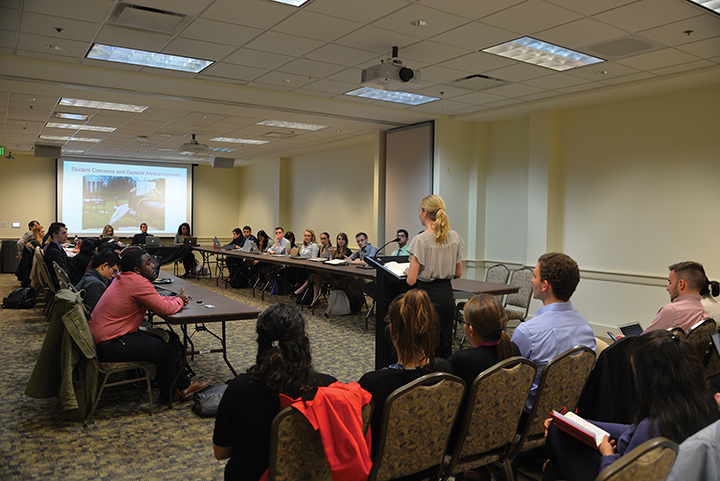New SGA president A.J. Pruitt is working to establish two ad hoc committees to investigate affordable housing in College Park and SGA election reform.
The committees, which will expire after policy recommendations are given, will begin working by the end of this academic year, Pruitt said.
“If these committees say we do need a more permanent body [to focus on these issues], that is something we will consider at the end of their time whenever we receive their public report,” said Pruitt, a junior economics and government and politics major.
Election reform
The election committee will focus on changing the Student Government Association’s election rules to increase competitiveness and voter turnout, Pruitt said. Christian Knapp, who will chair the committee, and about five other members will look at the best practices of other colleges and universities in the United States as a model.
“[The committee] will spend the summer and the first couple of months of the year interviewing people around SGA and student leaders outside SGA … to understand what changes we need to make,” Pruitt said.
[Read more: SGA presidential candidates discuss affordability and student involvement in final debate]
The committee is expected to report recommendations this November, when the SGA will discuss rules for the spring 2018 election.
Knapp, who served in the SGA during the 2014-15 legislative session, approached Pruitt about it during the SGA campaign season this year, Pruitt said.
“He has always been helpful in advising me,” Pruitt said. “He saw this issue coming up in the last election and it’s something he’s wanted to work on, and rhetoric surrounding this election is where he saw the opportunity come up.”
Knapp said many of the last few SGA elections at this university have been uncontested and he wants that to change.
“We have no shortage of students who are involved in a variety of activist organizations advocating on a variety of issues, many of which the SGA is involved in,” said Knapp, a junior economics and government and politics major. “So it’s puzzling to me as to why more students don’t run and why turnout is so low.”
In 2016, Katherine Swanson and the Bold Party won an uncontested SGA election in which 1,576 students voted. This year, the organization saw a slight increase in turnout to 2,235 votes, but the election was again virtually uncontested with just one registered party. Pruitt, who ran with the One Party, earned 85 percent of the vote in a race against Chris Boretti, who ran unaffiliated.
Pruitt said he is interested in reaching out to Boretti, as well as members of the former Unity Party, to get them involved with the committee.
“[Boretti] did make it a big issue and I think it’s a meaningful and worthwhile issue,” Pruitt said. “I don’t know what their role will be yet but I want them to help in some form.”
Boretti said he would like to get involved with the committee in any way the SGA allows him to. Boretti wants to focus on making the process of running for elections less intimidating for SGA outsiders and expanding the length of the election season.
“I’d like to figure out a way to do public funding for campaigns because it may incentivize members of the student community who don’t have friends in the SGA to run and have their voices heard,” Boretti said.
Affordable housing
The affordable housing committee will collect data to determine why housing in College Park is relatively unaffordable for college students, Pruitt said. Policy recommendations from the committee will catalyze SGA legislation to create affordable housing and keep prices down, Pruitt said.
“For the most part, housing is not affordable right now in College Park,” Pruitt said. “And to do meaningful work, we need to have more information on why that is, what are the structural problems, and that data will give us a better understanding of what we can do.”
Earlier in the semester, the Graduate Student Government held a town hall for College Park residents to discuss issues regarding housing prices in the area. At the meeting, Eric Olson, executive director of the College Park City-University Partnership, said county officials might be less concerned about the issue because pricing is seen as affordable in comparison to surrounding areas such as Fairfax and Arlington.
Pruitt said the committee hopes to work with the economics department and other groups at this university such as the GSG, in addition to the College Park City Council.
[Read more: UMD graduate students call for more affordable off-campus housing options in College Park]
Co-op Housing University of Maryland President Andrea Muñoz Beaty said her organization sees itself as the solution to the affordable housing problem. CHUM rents houses from local landlords and then rents space to members that have been accepted to the cooperative through an application process, according to its website.
Student ownership of houses provides the opportunity for rent to stay low because student owners would be able to charge less for rent, whereas landlords have the freedom to raise prices when the property value in the area increases, Beaty said.
The most significant barrier to solving the affordable housing problem is the lack of understanding among students, the university administration and the city council that this is an issue that can be fixed, Beaty said.



